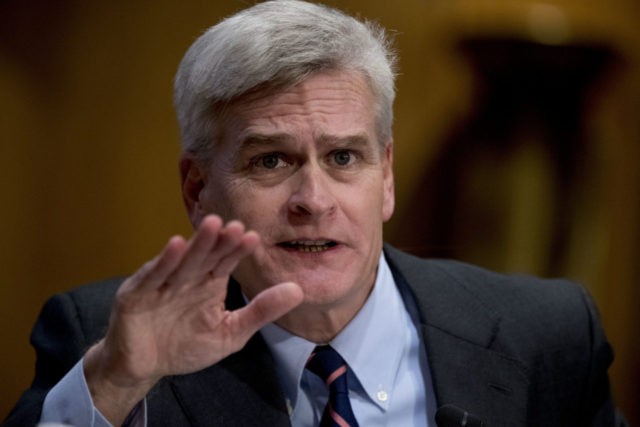Sen. Bill Cassidy (R-LA) told Breitbart News in an exclusive interview Thursday that Republicans need to counter Medicare for All with their own proposal.
Cassidy revealed that he continues to work on his own proposal, based on the successful CHIP program, that would allow states to design a healthcare plan that works best for their citizens.
Sen. Cassidy, a doctor and one of the Senate’s foremost experts on health care, spoke with Breitbart News regarding his many many proposals to lower healthcare costs, as President Donald Trump recently declared that the Republican party would become the party of health care.
Cassidy suggested that Republicans need to engage in a two-pronged approach: #1 in which the GOP can pass bipartisan legislation to increase healthcare price transparency and curb surprise bills, and #2 in which Republicans offer a dynamic alternative to Medicare for All.
The Lousiana Republican contended the GOP has the prevailing ideas on health care and can win on health care in the face of a rising national interest in a single-payer, government-run healthcare program such as Medicare for All.
“First you have to have the ideas, and I think we have a whole set of ideas to lower drug costs, lower the cost of insurance, and independently lowering the cost of health care,” Cassidy said.
Cassidy added, “But then on a bigger level, there’s going to be a philosophical debate over the next election season over whether we should double down on government control, for example, Medicare for All, or whether we want to emphasize these market-based solutions, price transparency, Association Health Plans, etc.”
Cassidy then said that as the country approaches the 2020 presidential election, a larger national debate over health care will grow as Americans decide whether to choose Medicare for All or market-based solutions to America’s health care problems.
Sen. Cassidy charged that Republicans need to “step forward” with their own plan.
President Trump tapped Sens. John Barrasso (R-WY), Rick Scott (R-FL), and Cassidy to work on President Trump’s new healthcare plan going into the 2020 presidential election; Trump signaled that they will only vote on the plan after the election.
Cassidy said he continues to work on a fully-baked healthcare proposal that would build upon the success of the Children’s Health Insurance Program (CHIP) and would reflect much of the federalist allure of the Graham-Cassidy block-grant Obamacare repeal proposal by allowing states to design their own healthcare plans while protecting patients with pre-existing conditions.
Sen. Cassidy said, “I think at that point, Republicans have got to step forward with a plan, I am working on such a plan, it builds upon the Children’s Health Insurance Program [CHIP], which I call it CHIP 2.0, and in CHIP 2.0, which Democrats 100 percent like, no disagreements that it adequately protect pre-existing conditions. We would allow states the flexibility to enroll folks in a program that works for their state. Obviously, Rhode Island is different than Alaska, that works for their state and would allow for them to lower the cost of health care and lower the cost of health insurance. It protects the patient with federal protections but gives the states latitude to put in a program which works for that particular state, and builds upon the CHIP program, which just has a track record of success.”
Cassidy, along with Sen. Lindsey Graham (R-SC) crafted the Graham-Cassidy block-grant repeal that almost passed through the Senate in 2017. Cassidy and Graham’s legislation garnered mass appeal through its federalist approach, which would give states the ability to craft their own healthcare plan. Graham argued by granting more power to the states, they would prevent Democrats from implementing a national single-payer healthcare plan such as Medicare for All.
CHIP, a federal-state partnership program created in the 1990s to help vulnerable children obtain health insurance coverage, has largely helped working families who made too much for Medicaid but did not make enough for health insurance. The federal government splits the payment for CHIP with states and helps roughly nine million children obtain health insurance.
To illustrate CHIP’s success, the rate of uninsured children dropped from 15 to fice percent since CHIP’s creation.
Sen. Cassidy said that building upon the success of the CHIP program, he can help forge a coalition to pass a successful Republican healthcare program.
“If you build upon something which has been empirically successful, then you’re more likely to build a coalition that will pass legislation,” Cassidy said.
Cassidy also said that Republicans need to look at smaller, more bipartisan measures such as curbing surprise billing to help lower costs.
“Number two, ideally the smaller bills are bipartisan, we need 60 votes to pass these bills in the Senate, and then we need it to pass through the House,” Cassidy added. “That’s why I emphasize our surprise medical billing on our price transparency that we are working on a bipartisan basis.”
Sens. Cassidy, Michael Bennet (D-CO), Chuck Grassley (R-IA), Tom Carper (D-DE), and Todd Young (R-IN) introduced last year legislation that would end surprise medical bills arising from charging patients with emergency treatments or treatments provided by an out-of-network provider at an in-network facility.
In one case, a patient had to pay roughly $109,000 for care after a heart attack and another had to pay nearly $18,000 for a urine test due to surprise billing.
“We are going to take her [the patient] out as the point of leverage, and providers and insurance companies want to disagree they’ll have an alternative mechanism by which to resolve their disagreement as opposed to working through the patient herself,” Cassidy said.
Sean Moran is a congressional reporter for Breitbart News. Follow him on Twitter @SeanMoran3.

COMMENTS
Please let us know if you're having issues with commenting.